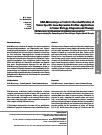Subscribe to RSS
DOI: 10.1055/s-2003-39371
DNA-Microarrays as Tools for the Identification of Tumor Specific Gene Expression Profiles: Applications in Tumor Biology, Diagnosis and Therapy
DNA-Microarrays als Hilfsmittel zur Identifikation tumorspezifischer Genexpressionsprofile: Anwendungen in Tumorbiologie, Diagnostik und TherapiePublication History
Publication Date:
02 June 2003 (online)


Zusammenfassung
DNA-Microarrays erlauben die Analyse des nahezu kompletten Genexpressionsprogrammes von Tumorproben und entsprechenden Vergleichsgeweben in jeweils einem einzigen Experiment. Hierdurch lässt sich eine große Probenzahl in relativ kurzer Zeit bearbeiten. Tumorspezifische Genexpressionsprofile können zur molekularen Klassifikation von Tumoren verwendet werden und bieten ein neues diagnostisches Hilfsmittel. Tumorspezifisch exprimierte Gene ermöglichen darüber hinaus Einblicke in die Biologie der Tumorzelle und können zur Entwicklung neuer Therapiestrategien beitragen. Die mit Hilfe von DNA-Microarrays generierten großen Datenmengen bieten jedoch auch neue Herausforderungen an die bioinformatische Datenauswertung und aufgrund noch unbefriedigender Zuverlässigkeit und Reproduzierbarkeit dieser Technologie ist der Einsatz komplementärer Methoden zur Verifizierung der gewonnenen Ergebnisse notwendig.
Abstract
DNA-microarrays allow the analysis of almost the complete gene expression program of tumor samples and normal control samples in a single experiment. This allows the processing of a large number of samples in a reasonable short time. Tumor specific gene expression profiles can be used for molecular tumor classification and as a new diagnostic tool. In addition, the identification of tumor specific genes can help to understand the biology of tumor cells and identified genes can be used for the development of new therapeutic strategies. However, the huge amount of data generated by DNA-microarrays creates new challenges for data analysis. In addition, accuracy and reproducibility of the available techniques require complementary methods for verification of DNA-microarray data.
Schlüsselwörter
DNA-Microarrays - Tumordiagnostik - Tumor(immun)therapie
Key words
DNA-Microarrays - tumor diagnosis - tumor (immuno)therapy

